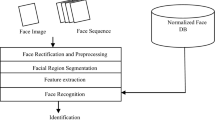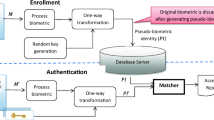Abstract
The recently proposed Facial Trait Code (FTC) formulates the component-based face recognition problem as a coding problem using Error-Correcting Code. The development of FTC is based on the extraction of local feature patterns from a large set of faces without significant variations in expression and illumination. This paper reports a new type of FTC that encompasses the faces with large expression variation and under various illumination conditions. We assume that if the patches of a local feature on two different faces look similar in appearance, this pair of patches will also show similar visual patterns when both faces change expressions and are under different illumination conditions. With this assumption, we propose the Polymorphous Facial Trait Code for face recognition under illumination and expression variations. The proposed method outperforms the original Facial Trait Code substantially in solving a strict face verification problem, in which only one facial image per individual is available for enrolling to the gallery set, and the probe set consists of facial images with strong illumination and expression variations.
Access this chapter
Tax calculation will be finalised at checkout
Purchases are for personal use only
Preview
Unable to display preview. Download preview PDF.
Similar content being viewed by others
References
Liao, R., Li, S.Z.: Face recognition based on multiple facial features. In: Proc. of the 4th IEEE Int. Conf. on Automatic Face and Gesture Recognition, pp. 239–244. Dekker Inc. (2000)
Ahlberg, J.: Facial feature extraction using deformable graphs and statistical pattern matching. In: Swedish Symposium on Image Analysis, SSAB (1999)
Heisele, B., Thomas, S., Sam, P., Poggio, T.: Hierarchical classification and feature reduction for fast face detection with support vector machines. Pattern Recognition 36(9), 2007–2017 (2003)
Heisele, B., Ho, P., Wu, J., Poggio, T.: Face recognition: component-based versus global approaches. CVIU 91(1), 6–12 (2003)
Ivanov, Y., Heisele, B., Serre, T.: Using component features for face recognition. In: FGR 2004, p. 421 (2004)
Heisele, B., Serre, T., Poggio, T.: A component-based framework for face detection and identification. IJCV 74(2), 167–181 (2007)
Lee, P.H., Hsu, G.S., Chen, T., Hung, Y.P.: Facial trait code and its application to face recognition. In: Bebis, G., Boyle, R., Parvin, B., Koracin, D., Remagnino, P., Porikli, F., Peters, J., Klosowski, J., Arns, L., Chun, Y.K., Rhyne, T.-M., Monroe, L. (eds.) ISVC 2008, Part II. LNCS, vol. 5359, pp. 317–328. Springer, Heidelberg (2008)
Figueiredo, M., Jain, A.: Unsupervised learning of finite mixture models. PAMI 24, 381–396 (2002)
Dietterich, T.G., Bakiri, G.: Solving multiclass learning problems via error-correcting output codes. Journal of Artificial Intelligence Research 2, 263–286 (1995)
Martinez, A., Benavente, R.: The ar face database. Technical Report 24, CVC (1998)
Turk, M., Pentland, A.: Eigenfaces for recognition. Journal of Cognitive Neuroscience 3(1), 71–86 (1991)
Belhumeur, P., Hespanha, J., Kriegman, D.: Eigenfaces vs. fisherfaces: Recognition using class specific linear projection. PAMI 19(7), 711–720 (1997)
Ahonen, T., Hadid, A., Pietikainen, M.: Face description with local binary patterns: Application to face recognition. PAMI, 2037–2041 (2006)
Author information
Authors and Affiliations
Editor information
Editors and Affiliations
Rights and permissions
Copyright information
© 2010 Springer-Verlag Berlin Heidelberg
About this paper
Cite this paper
Lee, PH., Hsu, GS., Hung, YP. (2010). Polymorphous Facial Trait Code. In: Zha, H., Taniguchi, Ri., Maybank, S. (eds) Computer Vision – ACCV 2009. ACCV 2009. Lecture Notes in Computer Science, vol 5996. Springer, Berlin, Heidelberg. https://doi.org/10.1007/978-3-642-12297-2_54
Download citation
DOI: https://doi.org/10.1007/978-3-642-12297-2_54
Publisher Name: Springer, Berlin, Heidelberg
Print ISBN: 978-3-642-12296-5
Online ISBN: 978-3-642-12297-2
eBook Packages: Computer ScienceComputer Science (R0)




